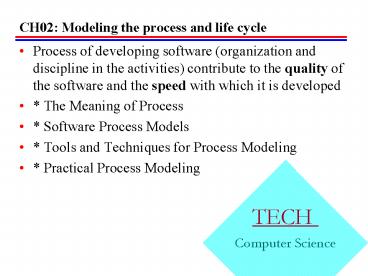CH02: Modeling the process and life cycle - PowerPoint PPT Presentation
1 / 20
Title:
CH02: Modeling the process and life cycle
Description:
CH02: Modeling the process and life cycle ... (state_of(car.gear) = park) (state_of(car.speed) = stand)) Dynamic Modeling: System Dynamics ... – PowerPoint PPT presentation
Number of Views:36
Avg rating:3.0/5.0
Title: CH02: Modeling the process and life cycle
1
CH02 Modeling the process and life cycle
- Process of developing software (organization and
discipline in the activities) contribute to the
quality of the software and the speed with which
it is developed - The Meaning of Process
- Software Process Models
- Tools and Techniques for Process Modeling
- Practical Process Modeling
TECH Computer Science
2
The Meaning of Process
- We can think of a set of ordered tasks as a
process a series of steps involving activities,
constraints and resources that produce an
intended output of some kind. - When the process involves the building of some
product, we sometimes refer to the process as a
life cycle.
3
Following a Process
- A process is a collection of procedures (a
recipe), organized so that we build products to
satisfy a set of goals or standards. - Processes are important because they impose
consistency and structure on a set of activities.
- When we know how to do something well and we want
to ensue that others do it the same way.
4
Writing a Process (Writing a program for
others to follow)
- Prescribe all major activities
- Uses resources, subject to a set of constraints
- May composed of sub-processes
- Each activities has entry and exit criteria
- Activities are organized in a sequence.
- State the goals of each activity.
5
Software Process Models
- are prescriptions for the way software
development should progress. - are descriptions of the way software development
is done in actuality. - Every software development process model includes
system requirements as input and delivered
product as output.
6
Waterfall Model
7
(Development process in reality)
8
V Model
9
Prototyping Model
10
Operational Specification requirements enacted
(automated) using a software package
11
Transformational Model
12
Phases Development
13
(Increments and Interactions)
14
Spiral Model //
15
Tools and Techniques for Process Modeling
- Choose Language or Notation
- A static model depicts the process, showing that
the inputs are transformed to outputs. - A dynamic model can enact the process, so that
the user can see how intermediate and final
products are transformed over time.
16
Static Modeling Lai Notation
- State tables show information about the
completeness of each artifact at a given time. - Transition diagrams show how the states are
related to one another.
17
State table and Transition diagram
Parked ((state_of(car.engine)
off) (state_of(car.gear) park) (state_of(car.spe
ed) stand))
18
Dynamic Modeling System Dynamics
- Simulate the process and make changes before the
resources are actually expended. - Factors affecting overall productivity.
- (Quantified) Relationships (links) between the
factors. - System dynamics models are supported by software
that simulates the overall process.
19
Practical Process Modeling
- used properly, process modeling offers great
benefits for understanding processes and
revealing inconsistencies. - Develop special language to help defining and
enacting processes, e.g. Marvel specification
language. - A process model is useful for guiding your
behavior when you are working with a group.
20
(No Transcript)































